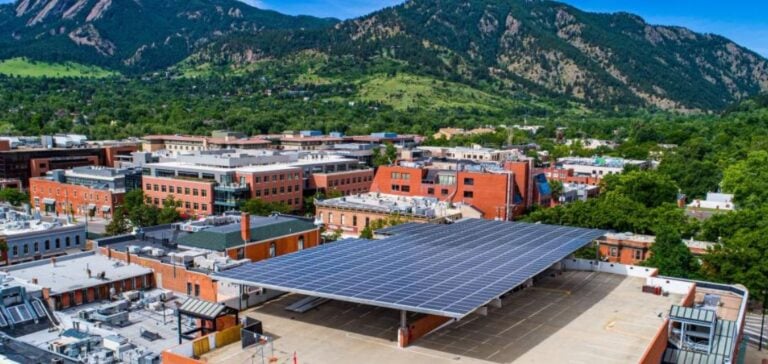The virtual net metering agreement enables CU Boulder to receive credits on its electricity bills for solar energy generated by an off-site installation, without the need for solar panels on campus.
The energy generated is fed directly into the power grid, contributing to the university’s decarbonization goals.
This innovative approach enables CU Boulder to reap the benefits of solar energy without the space and cost constraints associated with on-site panel installation.
Virtual net metering, made possible by Colorado Senate Bill 21-26, offers greater flexibility to institutions wishing to adopt renewable energy sources.
In addition, solar energy projects are multiplying in Colorado, like EE North America’s investment in the Colorado Solar Projects, or Tri-State, which acquired two solar projects from JUWI in June 2024.
Sustainability objectives
CU Boulder is committed to using 100% of the renewable energy credits (RECs) generated by the solar project.
These credits are essential to help the university achieve its goals of reducing Scope 2 emissions by 50% by 2030 and aiming for carbon neutrality by 2050.
By transferring these credits to CU Boulder, the project directly supports the university’s efforts to reduce its carbon footprint.
The use of RECs also enables CU Boulder to demonstrate its leadership in sustainability.
By integrating innovative energy solutions, the university is setting an example and encouraging other institutions to follow suit.
Project impact
The 5 MWdc solar project in Weld County is scheduled for completion in early 2026.
Once operational, it will generate around 9.5 million kilowatt-hours (kWh) of solar energy per year.
This is equivalent to powering over 850 homes and reducing CO2 emissions from 1,580 cars each year.
In addition to its environmental benefits, the project offers local economic opportunities.
The construction and maintenance of the solar park will create jobs and stimulate the regional economy.
This project highlights the potential of renewable energies to deliver both ecological and economic benefits.
Future prospects
This partnership between Pivot Energy and CU Boulder represents a model for similar collaborations in the future.
By harnessing the benefits of virtual net metering, other universities and institutions can adopt renewable energy solutions without the traditional constraints.
This approach could be replicated on a larger scale, promoting the energy transition nationally and internationally.
The successes of this project could encourage future legislation to support more virtual net metering projects.
Extending this model would accelerate the uptake of renewable energies, contributing to global targets for reducing greenhouse gas emissions.
By collaborating with Pivot Energy, CU Boulder is demonstrating how academic institutions can play a crucial role in the energy transition.
This partnership illustrates the importance of innovation and collaboration in achieving ambitious environmental goals.
This initiative demonstrates the potential of public-private partnerships to transform the energy landscape.
By combining the resources and expertise of various stakeholders, such projects can generate significant and lasting impacts.






















